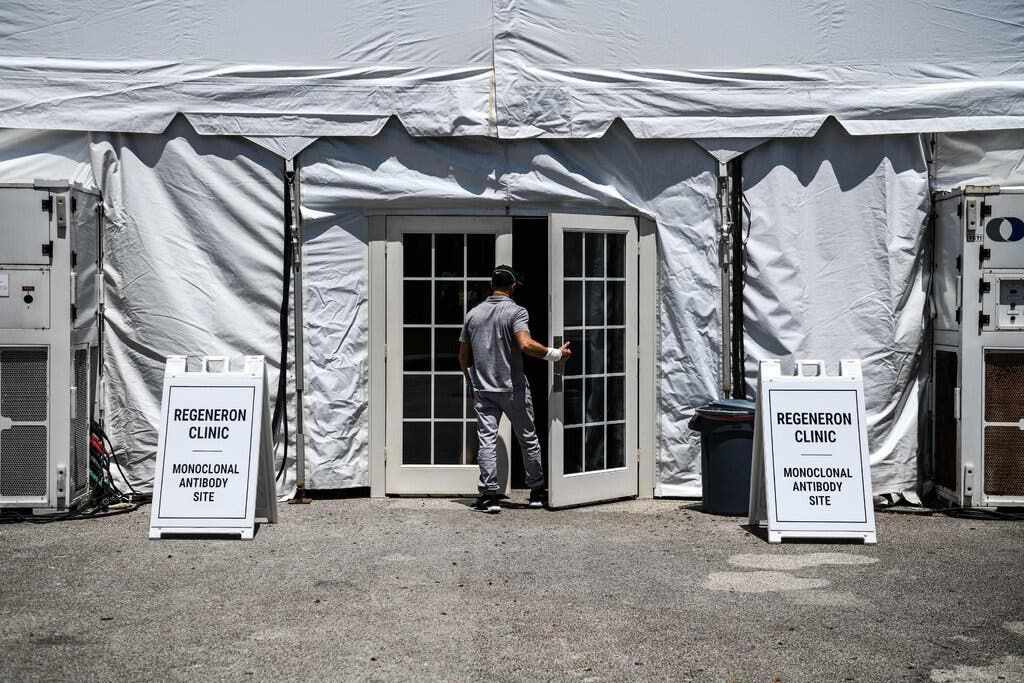Hospitals, pharmaceutical corporations, and officials from the Biden administration are rushing against the clock to combat one of the Omicron variant’s most serious threats: Two of the three monoclonal antibody therapies that physicians have relied on to protect Covid-19 patients from getting critically sick do not seem to be effective against the most recent strain of the coronavirus, according to preliminary findings.
The only such medication that is still expected to be effective against Omicron is currently in such short supply that many physicians and hospitals have already exhausted their stockpiles of the drug.
Monoclonal antibodies have emerged as a staple of Covid therapy, having been demonstrated to be very successful in preventing high-risk patients from being admitted to hospital. However, even as the number of infections continues to rise and Omicron becomes the predominant type of new cases in the United States, some hospitals have started to scale down treatments, believing that they have become abruptly ineffective.
According to the Centers for Disease Control and Prevention, the Omicron strain was responsible for an estimated 73 percent of new cases in the United States during the previous week of April. This is an increase from just over 12 percent the previous week.
Sotrovimab was already in great demand prior to the emergence of Omicron, and the availability of the drug is now very restricted. However, the situation is expected to improve to some extent during the next several weeks. According to an administration official, the Biden administration is in discussions with GlaxoSmithKline about obtaining more dosages that will be given by early next year.
According to two senior administration officials, regulators are also poised to approve antiviral tablets from Pfizer and Merck this week, marking the first two medications in a new class of Covid therapies to be approved by the FDA.
Both medications have the potential to prevent serious sickness in high-risk individuals who may otherwise have undergone antibody therapy… The medication developed by Pfizer, known as Paxlovid, is particularly interesting since it has been shown to be extremely successful — and hence likely to be effective against Omicron.
Even though supplies of these antivirals will be restricted at initially, clinicians who have relied on monoclonal antibodies to treat Covid patients until now may find themselves in a better position as a result of even minor increases in supply.
Dr. Bob Wachter, head of the Department of Medicine at the University of California, San Francisco, cautioned, however, that the limited availability of antibody therapy may come as a surprise to patients who had previously expected they would be a dependable and effective therapeutic option.
Early in the epidemic, researchers at Regeneron and Eli Lilly won FDA approval for monoclonal antibody therapy that were developed by examining the blood of persons who had recovered from the sickness earlier in the pandemic.
Each patient generated a plethora of distinct antibodies that were all unique. The businesses honed down on one or two that had shown to be particularly effective at preventing prior strains of the coronavirus from spreading.
It was discovered in clinical studies that if these antibodies were given to individuals early in the course of their disease, they were useful in averting hospitalisation. During his battle with Covid, President Trump was treated with monoclonal antibodies manufactured by Regeneron.
At initially, physicians had difficulty obtaining the limited supply of medication. The medications were frequently provided as intravenous infusions in hospitals or clinics, with sessions lasting several hours at a time on occasion. Despite the inconvenience, monoclonal antibodies have been widely used in the treatment of Covid disease.
Drive-through monoclonal antibody clinics were put up at several hospitals to make them more accessible to patients. Doctors also started administering the medications to persons who had just been exposed to the coronavirus as a means of preventing them from becoming ill with the virus.
According to the Department of Health and Human Services, about 68,000 doses of monoclonal antibodies were handed out throughout the country in the previous week. The majority of the patients received therapy from Regeneron, with the remainder receiving medication from Eli Lilly.
Given Omicron’s rapid arrival, the Food and Drug Administration has been compelled to act swiftly in order to find out how to govern monoclonal antibodies in this new chapter of the pandemic.
During a recent interview, Dr. Lindsay Petty, an infectious disease expert at the University of Michigan School of Medicine, said she and her colleagues were debating whether or not to transition from the widely available monoclonal antibodies to the more rare sotrovimab treatment.
Omicron monoclonal antibodies are currently being developed by both Regeneron and Eli Lilly, although it will be some months before they are ready for clinical usage.

